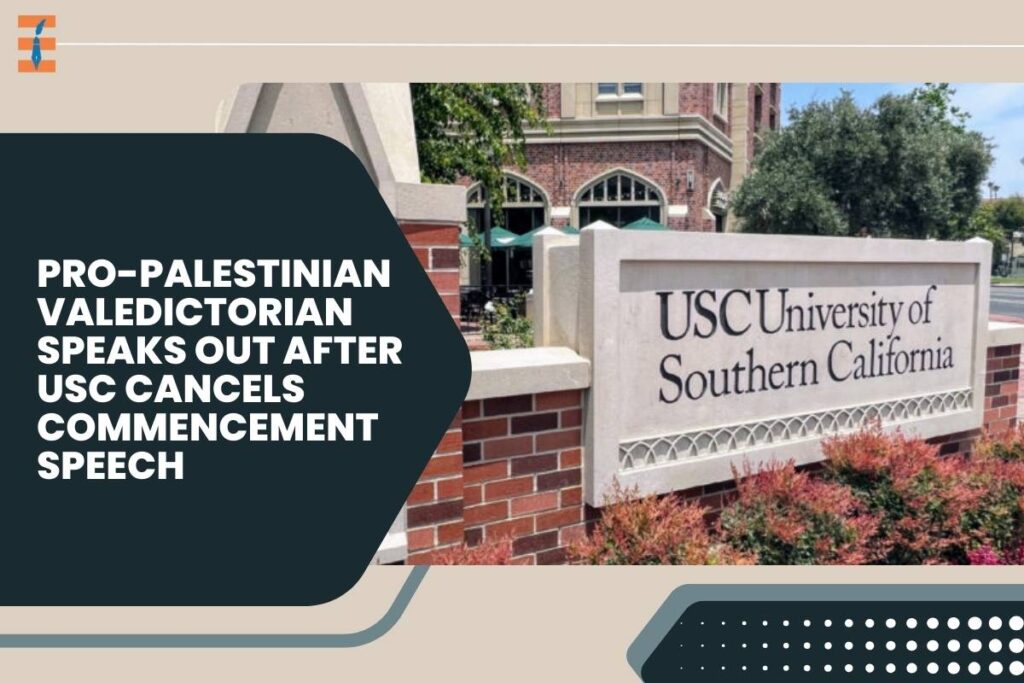Source-DNyuz
LOS ANGELES (KABC) — Asna Tabassum, USC’s 2024 valedictorian, has found herself at the center of a controversy after the university decided to cancel her commencement speech, citing safety concerns. Tabassum, known for her vocal support of Palestinian rights, expressed disappointment at the decision and questioned the lack of specific details provided by university officials regarding the alleged safety risks.
In an interview with Eyewitness News, Tabassum described her interaction with university officials as “almost a one-way conversation” and expressed skepticism about the safety justification. “It’s unfortunate, but you don’t get to speak,” Tabassum recounted being told by the university the day after pressing for more information.
A biomedical engineering student with a minor in resistance to genocide, Tabassum has been active in advocating for various causes, including Palestinian rights. Despite facing scrutiny and backlash on social media for her views, she remains steadfast in her beliefs. “I stand by exactly what I stand by. It is the very values and lessons USC taught me,” Tabassum affirmed.
Andrew T. Guzman, USC’s provost and senior vice president for academic affairs, defended the university’s decision in a statement, citing the “alarming tenor” surrounding the debate over Tabassum’s selection as valedictorian speaker. Guzman emphasized the substantial security risks associated with Tabassum’s speech at an event expected to draw 65,000 attendees to the campus.
Controversy Over Safety and Speech at USC
Guzman did not disclose specific threats but mentioned concerns about escalating tensions, fueled by social media and ongoing conflicts in the Middle East, potentially leading to disruptions or violence at the commencement ceremony. Groups such as Trojans For Israel have accused Tabassum of anti-Semitic behavior based on her online posts.
In response to criticism and allegations, Tabassum reiterated her commitment to standing up for her beliefs. “I don’t believe it’s ironic for me to minor in something called resistance to genocide, and then speak out on it and then be revoked because I’m penalized for something that people have an issue with,” she stated.
The university’s decision has sparked debates about free speech, safety on campuses, and the intersection of political activism with academic recognition. Some argue that universities should uphold principles of free expression and provide platforms for diverse perspectives, even if controversial. Others emphasize the duty of universities to prioritize safety and avoid potential disruptions that could endanger students and attendees.
Safety, Speech, and Activism: A Campus Conundrum
Guzman emphasized that the decision to cancel Tabassum’s speech was solely based on safety concerns and consultations with campus safety experts. “This decision is not only necessary to maintain the safety of our campus and students but is consistent with the fundamental legal obligation – including the expectations of federal regulators – that universities act to protect students and keep our campus community safe,” Guzman stated.
As the discourse continues, Tabassum remains undeterred, buoyed by the support she has received from various quarters. Her story reflects broader societal debates about the limits of free speech, the responsibilities of institutions in managing controversies, and the challenges faced by activists advocating for marginalized communities.
The aftermath of this decision will likely echo in discussions about academic freedom, campus safety protocols, and the complexities of navigating contentious issues in educational settings. Tabassum’s voice, though momentarily silenced on the commencement stage, resonates in a larger conversation about the power dynamics shaping public discourse and activism within academic institutions.
Also Read: USC Professor Minuette Floyd Honored with Governor’s Award for Arts in Education










